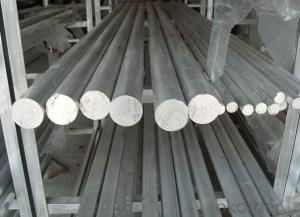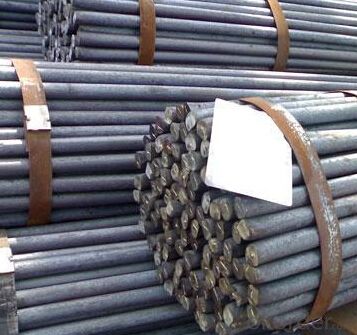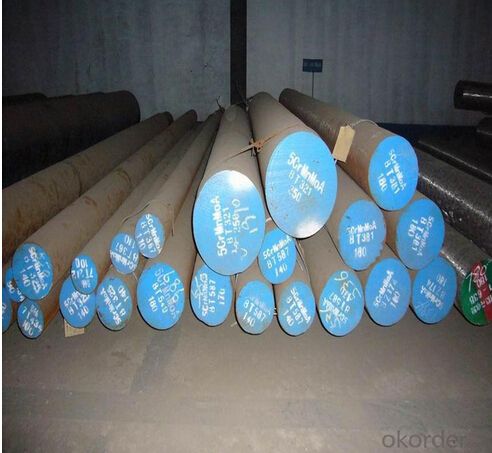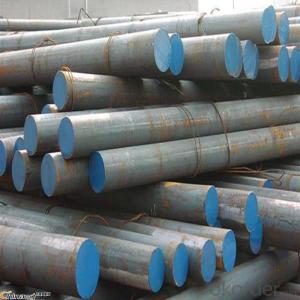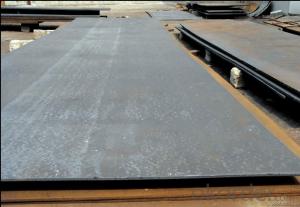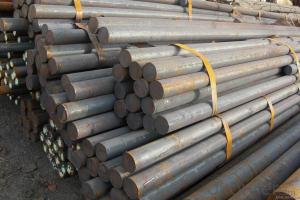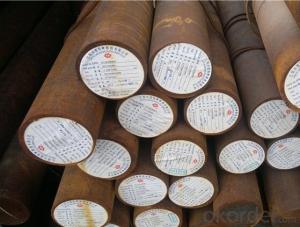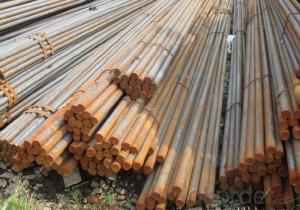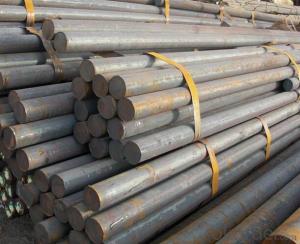3Cr2MnNiMo Tool Steel Special Steel Alloy Steel
- Loading Port:
- China main port
- Payment Terms:
- TT OR LC
- Min Order Qty:
- 25 m.t.
- Supply Capability:
- 10000 m.t./month
OKorder Service Pledge
OKorder Financial Service
You Might Also Like
Specification
Chemical Composition(GB)%
| C | Si | Mn | Cr | Ni | Mo | P | S |
| 0.32-0.40 | 0.20-0.40 | 1.10-1.50 | 1.70-2.00 | 0.85-1.10 | 0.25-0.40 | ≤0.030 | ≤0.030 |
Standard
| GB | ASSAB | DIN | ISO |
| 3Cr2MnNiMo | 718 | 1.2738 | 40CrMnNiMo8-6-4 |
Available Size
| Rolled plate | 12-90mm×610mm×L |
Heat Treatment
| Processing | Temperature ℃ | Hardness |
| Anneal | 690-710 | ≤220HB |
| Quenching | 830-870 | 48-52HRC |
| Tempering | 580-650 | 28-35HRC |
Characterstics
| Characteristics | |||||
| 1.High hardening ability | |||||
| 2.Excellent polishing performance and smoothness |
Applications: Suitable for large size mirror dies,automobile tail lights,domestic electrical applicances,etc


1, Your advantages?
professional products inquiry, products knowledge train (for agents), smooth goods delivery, excellent customer solution proposale
2, Test & Certificate?
SGS test is available, customer inspection before shipping is welcome, third party inspection is no problem
3, Payment Terms?
30% TT as deposit and 70% before delivery.
Irrevocable L/C at sight.
4, Trading Terms?
EXW, FOB, CIF, FFR, CNF
6, After-sale Service?
We provides the services and support you need for every step of our cooperation. We're the business partner you can trust.
For any problem, please kindly contact us at any your convenient time.
We'll reply you in our first priority within 24 hours.
- Q: What are the main applications of special steel in the power storage industry?
- Special steel is widely used in the power storage industry for various applications. One of the main applications is in the manufacturing of battery components, where special steel is used to produce high-quality casings and connectors that ensure the safety and reliability of the batteries. Special steel is also utilized in the construction of power storage infrastructure, such as steel frames and supports for battery racks. Additionally, special steel is used in the production of power storage system components, like turbine blades, rotors, and stators, which are essential for efficient energy generation and storage. Overall, special steel plays a vital role in enhancing the performance, durability, and safety of power storage systems in the industry.
- Q: What are the main characteristics of wear-resistant steel?
- Wear-resistant steel, also known as abrasion-resistant steel, possesses unique characteristics that make it highly resistant to wear and tear. The main characteristics of wear-resistant steel include: 1. High hardness: Wear-resistant steel is typically hardened to a high level, which provides it with excellent resistance against abrasion, impact, and sliding wear. This hardness is achieved through processes such as quenching and tempering, resulting in a steel material that can withstand heavy loads and abrasive environments. 2. Exceptional toughness: In addition to high hardness, wear-resistant steel also exhibits exceptional toughness. This means that it can absorb impact and withstand heavy shocks without fracturing or breaking. This characteristic is crucial in applications where both abrasion and impact resistance are required, such as in mining equipment and earthmoving machinery. 3. Superior strength: Wear-resistant steel is known for its high strength, enabling it to withstand extreme forces and pressures. This strength is achieved through the use of alloys and heat treatment processes, resulting in a steel material that can withstand heavy loads and resist deformation even under intense wear conditions. 4. Excellent weldability: Wear-resistant steel is often designed with good weldability, allowing it to be easily joined or repaired using various welding techniques. This characteristic is significant as it allows for the fabrication of wear-resistant components and the repair of worn-out parts in a cost-effective manner. 5. Corrosion resistance: Some wear-resistant steel grades are also formulated to exhibit corrosion resistance properties. This feature ensures that the steel remains intact and does not deteriorate when exposed to harsh environments, chemicals, or moisture. This characteristic is particularly useful in applications where wear and corrosion occur simultaneously, such as in marine equipment or mining operations. 6. Extended service life: Due to its high hardness, exceptional toughness, superior strength, and corrosion resistance, wear-resistant steel offers an extended service life compared to other types of steel. Its ability to withstand wear, impact, and abrasion allows for reduced downtime and maintenance costs, making it highly desirable in various industries, including mining, construction, and manufacturing. Overall, the main characteristics of wear-resistant steel make it a reliable and durable material for applications where prolonged exposure to abrasive conditions is expected. Its unique properties ensure that it can withstand heavy loads, resist wear and tear, and maintain its integrity, ultimately leading to improved equipment performance and cost savings.
- Q: What are the factors that affect the weldability of special steel?
- The factors that affect the weldability of special steel include the chemical composition of the steel, the presence of impurities or alloying elements, the heat treatment history, the thickness of the steel, the welding process and technique used, and the pre-weld and post-weld treatments.
- Q: What are the limitations of using special steel in high-stress applications?
- There are several limitations to using special steel in high-stress applications. Firstly, special steel can be quite expensive compared to other materials. This can make it less feasible for certain projects or industries with budget constraints. Secondly, special steel may not always be readily available or easily sourced. This can lead to delays in production or construction timelines, which can be problematic in high-stress applications where time is of the essence. Additionally, special steel may have limitations in terms of its structural integrity. While it is generally stronger and more resistant to wear and tear compared to regular steel, it may still have certain limits in terms of load-bearing capacity. This means that in extremely high-stress applications, special steel may not be the most suitable choice. Moreover, special steel can be more difficult to work with compared to other materials. It may require specialized equipment or techniques for cutting, welding, or shaping, which can add complexity and cost to the manufacturing process. Lastly, special steel may have limitations in terms of its corrosion resistance. While it is generally more resistant to corrosion compared to regular steel, it may still be prone to rust or degradation if not properly maintained or exposed to harsh environments. This can be a concern in high-stress applications where the durability and longevity of the material are crucial. Overall, while special steel offers many benefits in high-stress applications, it is important to consider its limitations in terms of cost, availability, load-bearing capacity, workability, and corrosion resistance. These factors should be carefully evaluated to determine the most suitable material for a specific high-stress application.
- Q: How is special steel used in the production of pressure vessels?
- Special steel is employed in the manufacturing of pressure vessels because of its distinctive characteristics that make it suitable for enduring high-pressure environments. Pressure vessels, which are containers designed to hold gases or liquids at a significantly different pressure than the surrounding atmosphere, frequently find application in industries such as oil and gas, chemical, and power generation. To guarantee the safety and dependability of these containers, the use of special steel in pressure vessel production is essential. Special steels, including carbon steels, stainless steels, and alloy steels, provide improved mechanical properties, high strength, and exceptional resistance to corrosion. These attributes are crucial for withstanding the extreme pressure conditions experienced by pressure vessels. One of the primary roles of special steel in pressure vessel production is to provide resistance against internal pressure. The steel must possess the ability to endure the force exerted by the vessel's contents without deforming or rupturing. Due to the high strength and toughness of special steels, they are capable of handling these pressures, thereby ensuring the vessel's integrity and preventing catastrophic failures. Additionally, special steel plays a vital role in preserving the structural integrity of pressure vessels. These vessels encounter various external loads, such as wind, seismic forces, and thermal expansion. The superior mechanical properties of special steel enable it to withstand these loads without significant deformation or failure, thereby ensuring the structural stability of the pressure vessel. Moreover, special steel's resistance to corrosion is crucial in pressure vessel production. Pressure vessels frequently contain corrosive substances, and the corrosive environment can lead to material degradation over time. Special steels, particularly stainless steels, offer excellent corrosion resistance, thus minimizing the risk of material deterioration and prolonging the vessel's lifespan. In conclusion, special steel is used in the production of pressure vessels due to its high strength, toughness, and corrosion resistance. These properties enable the steel to endure high-pressure conditions, maintain structural integrity, and prevent failures related to corrosion. By utilizing special steel, manufacturers of pressure vessels can ensure the safety, dependability, and longevity of these critical containers.
- Q: What are the properties of corrosion-resistant alloy steel?
- Corrosion-resistant alloy steel possesses properties such as high resistance to corrosion, oxidation, and rusting, making it suitable for applications in aggressive environments. It exhibits excellent strength and durability, even in harsh conditions, while maintaining its corrosion resistance. Additionally, it can withstand high temperatures and pressures, making it ideal for industries like oil and gas, chemical processing, and marine applications.
- Q: What are the different methods for electroplating special steel?
- To electroplate special steel, various methods can be employed based on specific requirements and desired outcomes. The following are some commonly utilized techniques: 1. Electroless Nickel Plating: Achieving uniform and corrosion-resistant coatings on special steel is possible through this method, which entails depositing a layer of nickel onto the steel surface using a chemical reaction. 2. Zinc Plating: A protective layer is provided to special steel through the immersion of the steel in a zinc solution and the passage of an electric current, facilitating the deposition of zinc onto the surface. 3. Copper Plating: Enhancing conductivity and corrosion resistance of special steel can be achieved by immersing the steel in a copper sulfate solution and applying an electric current to deposit a layer of copper onto the surface. 4. Chromium Plating: This method is commonly employed to confer a decorative, corrosion-resistant, and hard-wearing surface on special steel. It involves immersing the steel in a chromium bath, and an electric current is applied to deposit a layer of chromium onto the surface. 5. Electroplating with Precious Metals: For decorative or functional purposes, special steel can be electroplated with precious metals like gold, silver, or platinum. These coatings enhance the appearance, conductivity, or corrosion resistance of the steel. 6. Electroplating with Alloy Coatings: Special steel can be electroplated with alloy coatings, such as tin-zinc or tin-lead, for specific applications that require unique properties like enhanced solderability or improved wear resistance. It is important to consider factors such as desired properties, intended application, and specific requirements of the special steel being plated when selecting an electroplating method. Each method has its advantages and limitations, making it advisable to consult experts in the field to determine the most suitable technique for electroplating special steel in a given scenario.
- Q: How does special steel contribute to the performance of industrial machinery?
- Special steel contributes to the performance of industrial machinery by providing enhanced strength, durability, and resistance to corrosion and wear. It enables the manufacturing of components that can withstand high temperatures, heavy loads, and harsh operating conditions, thereby improving the overall efficiency and lifespan of the machinery. Additionally, special steel alloys offer excellent machinability and formability, allowing for precise and complex designs, ultimately enhancing the functionality and reliability of industrial machinery.
- Q: How does special steel contribute to the automotive material recycling?
- Special steel contributes to automotive material recycling in several ways. Firstly, special steel is highly durable and resistant to corrosion, making it ideal for use in various automotive components such as engine parts, chassis, and body structures. This durability ensures that these components have a longer lifespan, reducing the frequency of replacement and consequently reducing waste generation. Additionally, special steel is highly recyclable, meaning that at the end of a vehicle's life cycle, the steel components can be easily and efficiently recycled. The recycling process involves melting down the steel and reusing it to create new steel products, thereby reducing the need for extracting and processing raw materials. Furthermore, the use of special steel in lightweighting initiatives, where lighter materials are used to reduce a vehicle's weight, contributes to fuel efficiency and lower emissions. This is significant for automotive material recycling as lighter vehicles require less energy to operate, resulting in reduced fuel consumption and environmental impact. Overall, the use of special steel in the automotive industry plays a crucial role in promoting sustainability through extended component lifespan, efficient recycling processes, and improved fuel efficiency.
- Q: What are the advancements and trends in the field of special steel?
- Recent years have seen remarkable progress and emerging patterns in the field of special steel, which have brought about revolutionary changes in various industries. The primary driving force behind these advancements is the increasing demand for high-performance materials in critical applications such as aerospace, automotive, energy, and construction. One of the major breakthroughs in the field of special steel is the development of advanced manufacturing techniques. Conventional steel production methods have been replaced by more efficient processes, such as electric arc furnaces and vacuum induction melting, resulting in improved steel quality and enhanced mechanical properties. These advancements have made it possible to produce special steels with exceptional strength, corrosion resistance, and heat resistance. Another significant trend in the field of special steel is the emergence of new alloy compositions. Researchers and manufacturers are continuously exploring and developing innovative alloying elements to enhance the properties of special steels. For example, the addition of elements like chromium, molybdenum, and vanadium has led to the creation of stainless steels with outstanding resistance to corrosion and oxidation. Furthermore, advancements in heat treatment processes have also been witnessed in the field of special steel. By utilizing advanced heat treatment techniques such as quenching and tempering, austempering, and martempering, special steels can achieve the desired hardness, toughness, and dimensional stability. These advancements have significantly broadened the range of applications for special steels, allowing them to be used in critical components that operate under extreme conditions. In addition to the progress in manufacturing and alloy compositions, there is a growing inclination towards the development of environmentally friendly special steels. With increasing concerns about sustainability and carbon footprint, researchers and manufacturers are focusing on reducing the environmental impact of steel production. This has resulted in the creation of special steels with lower carbon content, as well as the implementation of energy-efficient manufacturing processes. Moreover, the field of special steel is witnessing the integration of digital technologies and automation. The utilization of artificial intelligence, machine learning, and data analytics enables manufacturers to optimize production processes, improve quality control, and reduce costs. This shift towards Industry 4.0 is transforming the production and utilization of special steel, ensuring greater efficiency and precision in the manufacturing process. In conclusion, the field of special steel is experiencing significant advancements and trends that are fostering innovation in various industries. The development of advanced manufacturing techniques, new alloy compositions, improved heat treatment processes, environmentally friendly production methods, and the integration of digital technologies are revolutionizing the properties and applications of special steel. These advancements have not only enhanced the performance and durability of special steel but have also opened up new possibilities for its utilization in critical applications.
Send your message to us
3Cr2MnNiMo Tool Steel Special Steel Alloy Steel
- Loading Port:
- China main port
- Payment Terms:
- TT OR LC
- Min Order Qty:
- 25 m.t.
- Supply Capability:
- 10000 m.t./month
OKorder Service Pledge
OKorder Financial Service
Similar products
Hot products
Hot Searches
Related keywords
